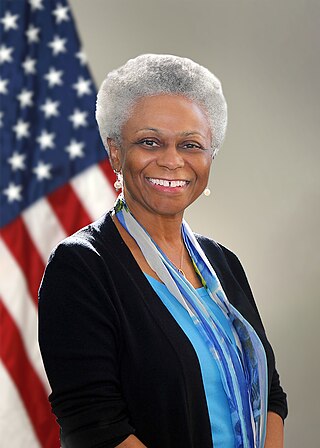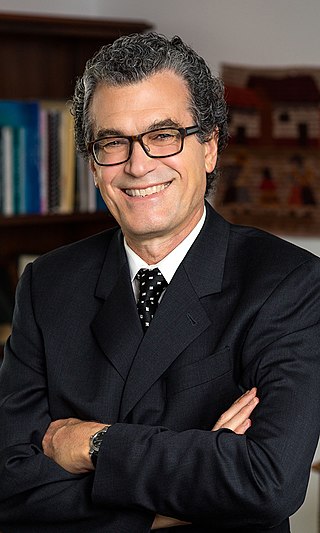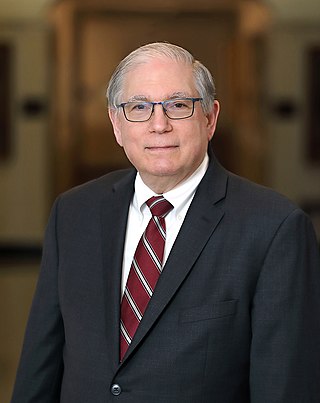The National Institute of Mental Health (NIMH) is one of 27 institutes and centers that make up the National Institutes of Health (NIH). The NIH, in turn, is an agency of the United States Department of Health and Human Services and is the primary agency of the United States government responsible for biomedical and health-related research.

Louis Wade Sullivan is an active health policy leader, minority health advocate, author, physician, and educator. He served as the Secretary of the United States Department of Health and Human Services during President George H. W. Bush's Administration and was Founding Dean of the Morehouse School of Medicine.
The Eunice Kennedy Shriver National Institute of Child Health and Human Development (NICHD) is one of the National Institutes of Health (NIH) in the United States Department of Health and Human Services. It supports and conducts research aimed at improving the health of children, adults, families, and communities, including:
Health Disparities Centers are institutions in the United States that cover a broad range of needs and focus areas to decrease currently disproportionate illness and disease rates that lead to health disparities. They also promote the engagement, empowerment and recruitment of underrepresented populations in health professions. Many programs devote significant resources to developing cultural competency training to promote the delivery of culturally sensitive healthcare by faculty and staff, as well as current and future healthcare providers. These services are usually tailored to meeting specific goals or missions of the individual components common in most of the operating Health Disparities Centers.
The PhenX Toolkit is a web-based catalog of high-priority measures related to complex diseases, phenotypic traits and environmental exposures. These measures were selected by working groups of experts using a consensus process. PhenX Toolkit's mission is to provide investigators with standard measurement protocols for use in genomic, epidemiologic, clinical and translational research. Use of PhenX measures facilitates combining data from a variety of studies, and makes it easy for investigators to expand a study design beyond the primary research focus. The Toolkit is funded by the National Human Genome Research Institute (NHGRI) of the National Institutes of Health (NIH) with co-funding by the Office of the Director (OD), the National Institute of Neurological Disorders and Stroke (NINDS), and the National Heart, Lung, and Blood Institute (NHLBI). Continuously funded since 2007, PhenX has received funding from a variety of NIH institutes, including the National Institute on Drug Abuse (NIDA), the National Institute on Mental Health (NIMH), the National Cancer Institute (NCI) and the National Institute on Minority Health and Health Disparities (NIMHD). The PhenX Toolkit is available to the scientific community at no cost.
Celia B. Fisher is an American psychologist. She is the Marie Ward Doty professor of ethics at Fordham University in New York City, and director of its Center for Ethics Education. Fisher is also the director of the HIV and Drug Abuse Prevention Research Ethics Training Institute (RETI). Fisher is the founding editor of the journal Applied Developmental Science and serves on the IOM Committee on Clinical Research Involving Children Dr. Fisher has over 300 publications and 8 edited volumes on children’s health research and services among diverse racial/ethnic, sexual and gender minority groups in the U.S. and internationally. She has been funded by NIAAA, NIAID, NICHD, NIDA, NIMHD, and NSF. Fisher is well-known for her federally funded research programs focusing on ethical issues and well-being of vulnerable populations including ethnic minority youth and families, LGBTQ+ youth, persons with HIV and substance use disorders, college students at risk for drinking problems, and adults with impaired consent capacity. Recent publications include research on health equity for BIPOC, LGBTQ+ and economically marginalized children, youth and young adults in areas including social determinants of sexual health, substance use, social media and offline discrimination, mental health and COVID-related distress and racial bias among Asian, Indigenous, Hispanic, Black and White adolescents and adults, and parental COVID-19 pediatric vaccine hesitancy across diverse populations.
M. Roy Wilson is an American ophthalmologist and academic administrator who served as the 12th President of Wayne State University.

Marie A. Bernard, M.D. is the Chief Officer for Scientific Workforce Diversity at the National Institutes of Health (NIH). Prior to this, she was the deputy director of the National Institute on Aging at the NIH, where she oversaw approximately $3.1 billion in research focused on aging and Alzheimer's disease. Bernard serves as a cochair of the Advisory Committee to the NIH Director Working Group on Diversity, the NIH Steering Committee Working Group on DEIA, and the NIH UNITE initiative launched in 2021 to identify and address any structural racism that may exist within NIH and throughout the biomedical and behavioral workforce. She also co-led the development of the Fiscal Years 2023 – 2027 NIH-wide Strategic Plan for Diversity, Equity, Inclusion, and Accessibility (DEIA) and is working on its implementation.

Yvonne T. Maddox is an American academic who currently works as vice president for research at the Uniformed Services University. She was previously the acting director of the National Institute on Minority Health and Health Disparities. Her career at the National Institutes of Health also includes previous leadership roles as acting deputy director of the National Institutes of Health and deputy director of the Eunice Kennedy Shriver National Institute of Child Health and Human Development.
Linda Burhansstipanov is an American public health educator and researcher. She is a member of the Cherokee Nation of Oklahoma and specializes on cancer care and support in Native American communities. A leader in Native American cancer research, she is the founder and president of the Native American Cancer Research Corporation, a non-profit organization that studies how the unique situations of Native Americans interact with cancer treatment. She is also a member of the National Institutes of Health national advisory council on Minority Health and Health Disparities. Native American communities have distinctive cultural beliefs and communicative practices, and are often impacted by social determinants of health related to poverty and associated public health concerns. Burnhansstipanov has worked on a broad array of research projects related to how such factors shape community's understandings of cancer and treatment. She is also an expert on Community-based participatory research, which aims to empower communities as equal participants in the research process and has published several articles using this methodology.

Eliseo J. Pérez-Stable is a Cuban-American physician-scientist. He is the director of the National Institute on Minority Health and Health Disparities.

Anna María Nápoles is an American behavioral epidemiologist and science administrator. She is the Scientific Director of the Intramural Research Program at the National Institute on Minority Health and Health Disparities. She was a professor and epidemiologist at University of California, San Francisco.

Michele Kim Evans is an American internist and medical oncologist. She is a senior investigator and Deputy Scientific Director at the National Institute on Aging.
Jacquelyn Taylor is the Helen F. Petit Endowed Professor of Nursing at Columbia University School of Nursing (CUSON), where she is also the Founding Executive Director of the Center for Research on People of Color (CRPC). Dr. Taylor is also the Founding Executive Director of the Kathleen Hickey Endowed Lectureship on Cardiovascular Care, the first endowed lectureship honoring a nurse scientist at Columbia University. Additionally, Dr. Taylor holds an administrative role as Senior Advisor to the Chair of the Division of Cardiology at Columbia University Medical Center. Dr. Taylor has been a trailblazer in cardiovascular genomics research among minority populations, and diversity and inclusion efforts, having been the first black woman to earn tenure at CUSON, New York University School of Nursing, and the Yale School of Nursing. Dr. Taylor has been recognized for her contributions to the advancement of biomedical sciences, health care, and public health, having been elected to the National Academy of Medicine in 2019. Dr. Taylor is committed to mentoring and advancing health equity as she received the Columbia University Irving Medical Center 2021 Mentor of the Year Award and the 2021 Friends of the National Institute of Nursing Research (FNINR) President's Award for her significant work in race, culture, and disparities in healthcare. Dr. Taylor has been PI of many studies including, but not limited to, an R01 from National Institute of Nursing Research (NINR)- The Intergenerational Impact of Genetic and Psychological Factors on Blood Pressure (InterGEN), a Presidential Early Career Award for Scientists and Engineers (PECASE) award from President Obama in 2017, an MPI on a P20 from NINR on Precision Health in Diverse Populations in 2018, an MPI on an R25 on Research Opportunities in Cardiovascular Diseases for Minority Undergrad and Grad Students Across the Health Sciences (RECV) in 2020, an MPI of the TRANSFORM TL1 in 2021, and MPI on a NHLBI funded T32 on Postdoctoral Training in Atherosclerosis in 2022. In 2023, she was awarded grants as MPI on an NHLBI funded R01 on 'The Impact of a race-Based stress reduction intervention on well-being, inflammation, and DNA methylation on Older African American Women at Risk for Cardiometabolic Disease' (RiSE) and a NIMHD funded R01 'Identifying and reducing stigmatizing language in home healthcare' (ENGAGE), and MPI of a U54 from NICHD on NY-Community-Hospital-Academic Maternal Health Equity Partnerships (NY-CHAMP), and PI of its training core. In addition to leading these grants, Dr. Taylor founded the Office of Diversity and Inclusion at the Yale School of Nursing and served as its inaugural Associate Dean of Diversity, and then went on to become the inaugural Endowed Chair of Health Equity and to develop and direct the Meyers Biological Laboratory at NYU before joining Columbia University.

Monica S. Webb Hooper is an American behavioral scientist and clinical psychologist serving as deputy director of the National Institute on Minority Health and Health Disparities. She was a professor at Case Western Reserve University and associate director for cancer disparities research and director of the Office of Cancer Disparities Research in the Case Comprehensive Cancer Center.

Lawrence A. Tabak is an American dentist and biomedical scientist serving as the principal deputy director of the National Institutes of Health. He served as acting director from 2021 to 2023. Previously he was the director of the National Institute of Dental and Craniofacial Research from 2000 to 2010.

Shannon Nicole Zenk is an American nurse scientist specialized in researching social inequities and health disparities. She is director of the National Institute of Nursing Research.

Tara A. Schwetz is an American biophysicist and government administrator who serves as a deputy director of the National Institutes of Health. She previously served as Acting Principal Deputy Director.
Bonnielin Swenor is an American epidemiologist who is the endowed professor of disability health and justice and director of the Johns Hopkins University Disability Health Research Center. Her work uses data-driven approaches to advance equity for people with disabilities and change public perceptions of disability, away from "living with disability" and toward "thriving with a disability".















